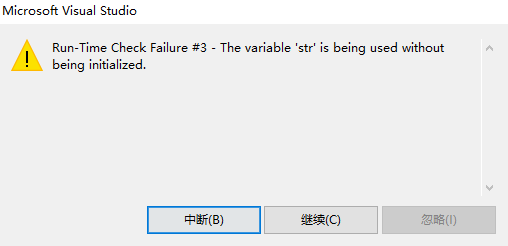#include "stdafx.h" #include "stdlib.h" int _tmain(int argc, _TCHAR* argv[]) { //输入字符串 char *str; scanf("%s",str); printf("输出输入的字符串*str=%s ",&str); system("pause"); return 0; }
代码出现指针问题

原因:
这样使用容易造成内存错误。
char *str; 声明了一个指针,但没有对其进行初始化,他的值是一个无法预知的值。可能指向一段空的内存,也可能指向其他程序使用的内存地址,也可能不是无用的内存地址。
scanf("%s",str); 的意思是获取一段字符串,并把字符串放到str所指的内存地址之后的一段空间。但本程序并没有申请内存空间,所指的那段内存空间就是上面三种情况中的一种。所以有可能就将其他程序的内存内容给改变了,其他程序崩溃了。
printf("输出输入的字符串*str=%s
",&str);
这个输出语句也存在问题,&str 应改为str,这的值是字符串地址的头指针,而不是str这个变量所在的地址。&str str这个变量在内存中的地址。str 的值是字符串地址的头指针
改正:
#include "stdafx.h" #include "stdlib.h" int _tmain(int argc, _TCHAR* argv[]) { //输入字符串 char str[50]; scanf("%s",str); printf("输出输入的字符串*str=%s ",str); system("pause"); return 0; }
或者:
#include "stdafx.h" #include "stdlib.h" int _tmain(int argc, _TCHAR* argv[]) { //输入字符串 char *str = (char*)malloc(100); scanf("%s",str); printf("输出输入的字符串*str=%s ",str); system("pause"); return 0; }